-
 Bitcoin
Bitcoin $114000
0.76% -
 Ethereum
Ethereum $3488
0.53% -
 XRP
XRP $2.908
2.27% -
 Tether USDt
Tether USDt $1.000
0.05% -
 BNB
BNB $750.3
0.39% -
 Solana
Solana $161.9
0.14% -
 USDC
USDC $1.000
0.03% -
 TRON
TRON $0.3258
1.22% -
 Dogecoin
Dogecoin $0.1991
1.38% -
 Cardano
Cardano $0.7260
3.39% -
 Hyperliquid
Hyperliquid $38.20
2.33% -
 Stellar
Stellar $0.3987
7.33% -
 Sui
Sui $3.414
1.17% -
 Chainlink
Chainlink $16.28
2.52% -
 Bitcoin Cash
Bitcoin Cash $542.2
2.07% -
 Hedera
Hedera $0.2489
7.51% -
 Ethena USDe
Ethena USDe $1.001
0.05% -
 Avalanche
Avalanche $21.40
0.70% -
 Toncoin
Toncoin $3.635
0.75% -
 Litecoin
Litecoin $109.8
2.04% -
 UNUS SED LEO
UNUS SED LEO $8.955
-0.02% -
 Shiba Inu
Shiba Inu $0.00001221
2.44% -
 Uniswap
Uniswap $9.152
2.20% -
 Polkadot
Polkadot $3.588
2.09% -
 Monero
Monero $298.1
1.27% -
 Dai
Dai $1.000
0.01% -
 Bitget Token
Bitget Token $4.326
1.28% -
 Pepe
Pepe $0.00001045
1.96% -
 Cronos
Cronos $0.1330
4.27% -
 Aave
Aave $257.9
2.12%
How to ensure the security of Ethereum spot trading?
Secure Ethereum spot trading demands a multifaceted approach: choosing reputable exchanges, implementing robust account security (strong passwords, 2FA), safeguarding private keys (hardware wallets preferred), managing trading risks (diversification, stop-loss orders), and staying updated on security news.
Feb 27, 2025 at 10:12 pm
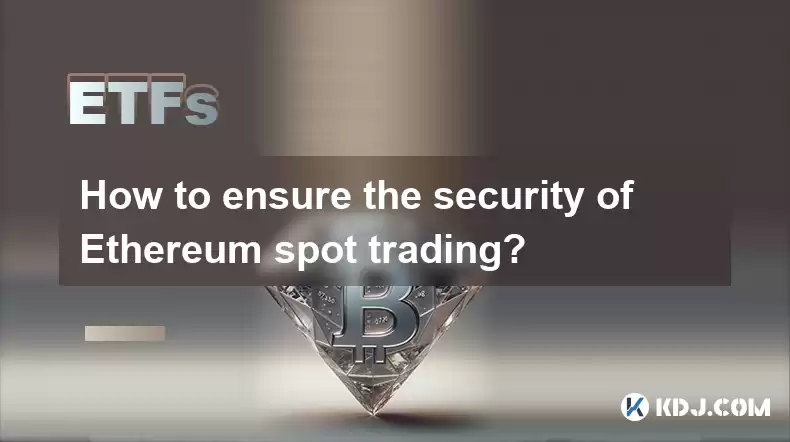
How to Ensure the Security of Ethereum Spot Trading?
Key Points:
- Understanding Ethereum's Decentralized Nature and its Implications for Security: Ethereum's decentralized nature offers inherent security advantages but also presents unique vulnerabilities that centralized exchanges don't face. This section will detail how to navigate this duality.
- Choosing a Reputable and Secure Exchange: Selecting a trustworthy platform is paramount. We'll delve into criteria for evaluating exchanges, focusing on security features, regulatory compliance, and reputation.
- Implementing Robust Account Security Measures: Protecting your account from unauthorized access is crucial. This section will cover best practices like strong passwords, two-factor authentication (2FA), and regular security audits.
- Safeguarding Your Private Keys: Private keys are the cornerstone of Ethereum security. We'll explain the importance of proper key management, including hardware wallets, secure storage practices, and avoiding phishing scams.
- Understanding and Managing Trading Risks: Spot trading inherently carries risk. This section will explore risk mitigation strategies, including diversification, stop-loss orders, and responsible trading habits.
- Staying Informed about Security Updates and Vulnerabilities: The cryptocurrency landscape is constantly evolving. This section highlights the importance of staying updated on security news, patches, and potential vulnerabilities.
- Understanding Ethereum's Decentralized Nature and its Implications for Security:
Ethereum's decentralized architecture is a double-edged sword when it comes to security. On one hand, it makes the network incredibly resilient to single points of failure. No single entity controls Ethereum, making it significantly harder for malicious actors to compromise the entire system. A distributed ledger ensures transparency and immutability, making it difficult to alter transaction history. However, this decentralization also means that individual users bear a greater responsibility for their own security. Unlike centralized exchanges that handle much of the security infrastructure, Ethereum users must actively manage their private keys and take precautions against various threats. This requires a deeper understanding of cryptographic principles, network protocols, and potential attack vectors. For example, while the Ethereum network itself is highly secure, users can still be vulnerable to phishing attacks, malware infections that steal private keys, or social engineering tactics that manipulate them into revealing sensitive information. Furthermore, the decentralized nature means there’s no central authority to compensate users for losses due to their own negligence or sophisticated attacks. Therefore, a comprehensive understanding of Ethereum's security landscape and the implementation of robust security measures is paramount for successful and secure spot trading. This includes understanding smart contract vulnerabilities, which, though not directly impacting spot trading, can indirectly affect the value of ETH and related tokens, influencing trading decisions and potential losses. The complexity of smart contracts requires constant vigilance and research to avoid unintended consequences. Ultimately, the decentralized nature of Ethereum shifts the responsibility for security significantly from the platform to the individual user.
- Choosing a Reputable and Secure Exchange:
Selecting a reliable and secure cryptocurrency exchange is the foundational step in ensuring the safety of your Ethereum spot trading activities. Many factors contribute to an exchange's security posture, and thorough research is crucial before entrusting your funds to any platform. A reputable exchange will boast robust security measures such as multi-signature wallets, which require multiple approvals for transactions, thereby mitigating the risk of unauthorized withdrawals. Cold storage, where the majority of the exchange's assets are stored offline, is another critical security feature, reducing the vulnerability to hacking attempts. Look for exchanges that undergo regular security audits by independent third-party firms. These audits assess the exchange's systems, procedures, and code for vulnerabilities, providing assurance of their commitment to security. Transparency is key; a trustworthy exchange will openly communicate its security practices and any incidents that may occur. Regulatory compliance is another important indicator. Exchanges operating under a regulated framework are subject to stricter oversight, potentially minimizing risks. Consider an exchange's reputation within the crypto community. Look for reviews and testimonials from other users, paying close attention to feedback regarding security incidents and customer support. Check for a strong track record of handling security issues effectively and promptly compensating affected users. Beware of exchanges that promise unrealistic returns or lack transparency regarding their operations; these could be red flags indicating a potentially risky platform. Finally, consider the exchange’s insurance coverage. While not a foolproof measure, insurance can provide a safety net in case of unforeseen security breaches or hacks. Thoroughly vetting an exchange is a crucial investment in protecting your Ethereum holdings and mitigating potential losses.
- Implementing Robust Account Security Measures:
Securing your Ethereum exchange account requires a multi-layered approach encompassing various security practices. Firstly, employing a strong, unique password is paramount. Avoid easily guessable passwords and utilize password managers to generate and store complex passwords for different accounts. Remember, your password is the first line of defense against unauthorized access. Next, enable two-factor authentication (2FA) whenever possible. This adds an extra layer of security by requiring a second verification step, typically through a code generated by an authenticator app on your smartphone or a hardware security key. Even if someone gains access to your password, they'll be blocked without the 2FA code. Regularly review your account activity for any suspicious transactions or login attempts. Many exchanges provide email or SMS alerts for unusual activities, enabling prompt detection and response to potential security breaches. Be cautious of phishing attempts, which are designed to trick you into revealing your login credentials or private keys. Never click on suspicious links or download attachments from unknown sources. Legitimate exchanges will never ask for your private keys or seed phrases via email or phone. Consider using a dedicated device for accessing your exchange account. This isolates your trading activities from other potentially vulnerable systems, minimizing the risk of malware infection. Keep your operating system and software up-to-date to benefit from the latest security patches. Outdated software is often vulnerable to exploits that malicious actors can leverage. Furthermore, maintain a strong awareness of common social engineering tactics. Scammers often use deception to manipulate users into compromising their security. Regularly review and update your security settings on your exchange account. Many exchanges offer various security options, such as IP whitelisting, which restricts logins to specific IP addresses. These measures significantly enhance your account's protection.
- Safeguarding Your Private Keys:
Private keys are the digital equivalent of your bank account's password; they grant you sole access to your Ethereum funds. Their security is paramount. Never share your private keys with anyone, under any circumstances. Legitimate entities, including exchanges and support staff, will never request your private keys. The safest way to store private keys is using a hardware wallet. Hardware wallets are physical devices specifically designed for securely storing cryptographic keys, offering robust protection against malware and online attacks. They provide an offline environment for managing your private keys, minimizing the risk of compromise. If you choose not to use a hardware wallet, ensure you store your private keys in a secure, offline location. This might involve writing them down on paper and storing them in a safe or safety deposit box. However, be extremely cautious with this method as physical loss or theft could result in irreversible loss of funds. Avoid storing your private keys digitally on your computer or phone, as these devices are susceptible to malware and hacking. If you must store them digitally, employ strong encryption and choose a highly secure password. Never use the same password for multiple accounts or services. Regularly back up your private keys, but ensure the backups are equally secure. Use a secure method to store these backups, and never share them with anyone. Be wary of phishing scams that attempt to trick you into revealing your private keys. Legitimate entities will never ask for your keys. If you receive a suspicious request, verify its authenticity through official channels. Understanding the importance of private key security is fundamental to protecting your Ethereum holdings. The consequences of losing or compromising your private keys are irreversible, resulting in the permanent loss of access to your funds.
- Understanding and Managing Trading Risks:
Ethereum spot trading, like any form of investment, carries inherent risks. Understanding and mitigating these risks is crucial for successful trading. Diversification is a key risk management strategy. Avoid investing all your capital in a single trade or asset. Spread your investments across multiple assets to reduce the impact of any single loss. Stop-loss orders are crucial tools for limiting potential losses. These orders automatically sell your asset when it reaches a predetermined price, preventing further losses if the market moves against you. Set realistic stop-loss levels based on your risk tolerance and market analysis. Avoid emotional trading. Fear and greed can lead to impulsive decisions that negatively impact your trading performance. Maintain a disciplined approach, sticking to your trading plan and avoiding impulsive actions driven by emotions. Thorough research and market analysis are essential before making any trading decisions. Understand the factors influencing the price of Ethereum and related assets. Stay informed about market trends, news events, and technological developments that may impact prices. Only trade with capital you can afford to lose. Never invest money you need for essential expenses or emergencies. This principle is crucial to responsible trading. Manage your position size appropriately. Avoid overleveraging, which can amplify both gains and losses. Understand the leverage offered by your exchange and use it cautiously. Regularly review your trading performance and adjust your strategies accordingly. Learn from both your successes and failures to improve your trading skills and risk management. Avoid get-rich-quick schemes and pump-and-dump schemes, which are often high-risk and unsustainable. Focus on long-term strategies and avoid chasing short-term gains.
- Staying Informed about Security Updates and Vulnerabilities:
The cryptocurrency landscape is constantly evolving, with new security threats and vulnerabilities emerging regularly. Staying informed about these developments is crucial for protecting your Ethereum holdings. Regularly follow reputable cryptocurrency news sources and security blogs to stay updated on the latest security advisories and vulnerabilities. Many exchanges and security firms publish reports and updates on potential threats and best practices. Be aware of common attack vectors, such as phishing scams, malware infections, and social engineering tactics. Familiarize yourself with these techniques to better identify and avoid them. Pay attention to security updates and patches released by your exchange and software providers. Promptly update your software and hardware to benefit from the latest security improvements. Consider participating in security audits or bug bounty programs offered by exchanges or projects. These programs encourage security researchers to identify vulnerabilities and report them responsibly. Engage with the Ethereum community and participate in forums and discussions related to security. This can provide valuable insights and warnings about potential threats. Understand the risks associated with smart contracts and decentralized applications (dApps) interacting with Ethereum. Many vulnerabilities have been discovered in smart contracts, potentially impacting the security of related assets. Regularly review your security practices and update your strategies as needed. The ever-changing nature of the cryptocurrency landscape requires constant vigilance and adaptation. Staying informed is a continuous process, not a one-time task. Ignoring security updates and vulnerabilities can expose your Ethereum holdings to significant risks.
FAQs:
Q: What is the best way to store my Ethereum?
A: The most secure method is using a hardware wallet. These offline devices offer the highest level of protection against hacking and malware. However, if you prefer not to use a hardware wallet, ensure you store your private keys securely offline, ideally written down and stored in a safe location. Never store private keys digitally on devices connected to the internet.
Q: How can I protect myself from phishing scams?
A: Never click on links or download attachments from unknown sources. Always verify the legitimacy of any communication from exchanges or other entities by contacting them through official channels. Legitimate organizations will never ask for your private keys or seed phrases.
Q: What should I do if I suspect my account has been compromised?
A: Immediately change your password and enable 2FA if you haven't already. Contact your exchange's support team and report the incident. Monitor your account activity closely for any unauthorized transactions.
Q: What is the role of two-factor authentication (2FA) in Ethereum security?
A: 2FA adds an extra layer of security by requiring a second verification step beyond your password, making it significantly harder for unauthorized individuals to access your account even if they obtain your password. It's a crucial security measure for all online accounts, especially those managing cryptocurrency.
Q: How can I choose a secure cryptocurrency exchange?
A: Look for exchanges with strong security features like multi-signature wallets and cold storage, regular security audits by reputable firms, and a transparent approach to security practices. Consider the exchange's regulatory compliance and its reputation within the crypto community.
Q: What are the risks associated with Ethereum spot trading?
A: Ethereum spot trading involves market risk (price fluctuations), operational risk (exchange failures, security breaches), and liquidity risk (difficulty selling assets quickly). Proper risk management strategies, such as diversification, stop-loss orders, and responsible trading habits, are crucial.
Q: How often should I update my security practices?
A: Regularly review and update your security practices. This is an ongoing process, not a one-time task. The cryptocurrency landscape is constantly changing, so staying informed and adapting your security measures is vital for maintaining the safety of your Ethereum holdings. At a minimum, review your security practices quarterly and update software and hardware as soon as security patches are available.
Disclaimer:info@kdj.com
The information provided is not trading advice. kdj.com does not assume any responsibility for any investments made based on the information provided in this article. Cryptocurrencies are highly volatile and it is highly recommended that you invest with caution after thorough research!
If you believe that the content used on this website infringes your copyright, please contact us immediately (info@kdj.com) and we will delete it promptly.
- XRP: Crypto Analyst's Smartest Buy in 2025?
- 2025-08-04 00:30:13
- SEC, Crypto Regulation, and Digital Assets: A New Era?
- 2025-08-04 00:30:13
- Navigating the Meme Coin Mania: Cold Wallets, SHIB, and DOGE in 2025
- 2025-08-03 22:30:16
- Bitcoin's Price Fall and Scrutiny: What's a New Yorker to Think?
- 2025-08-03 22:30:16
- Shiba Inu's Resistance and Recovery Push: What's Next for SHIB?
- 2025-08-03 22:50:16
- Bitcoin, Hashcash, and Crypto Innovation: A Look at the Foundation and Future
- 2025-08-03 23:12:53
Related knowledge
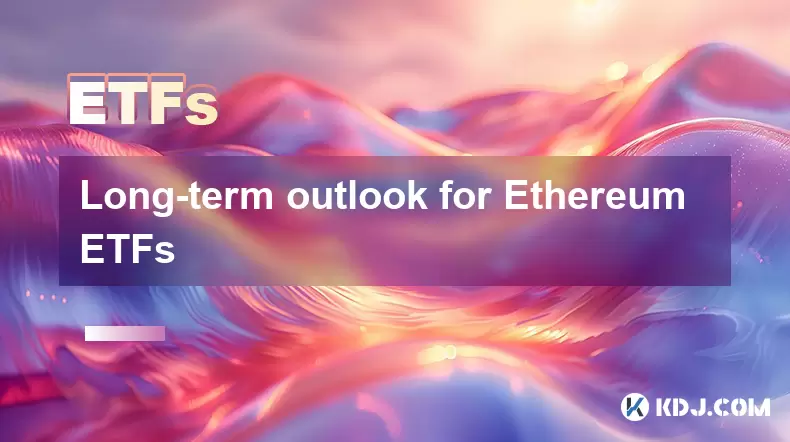
Long-term outlook for Ethereum ETFs
Jul 22,2025 at 06:42am
What Exactly Is an Ethereum ETF?An Ethereum Exchange-Traded Fund (ETF) is a financial product that tracks the price of Ethereum (ETH) and is traded on...
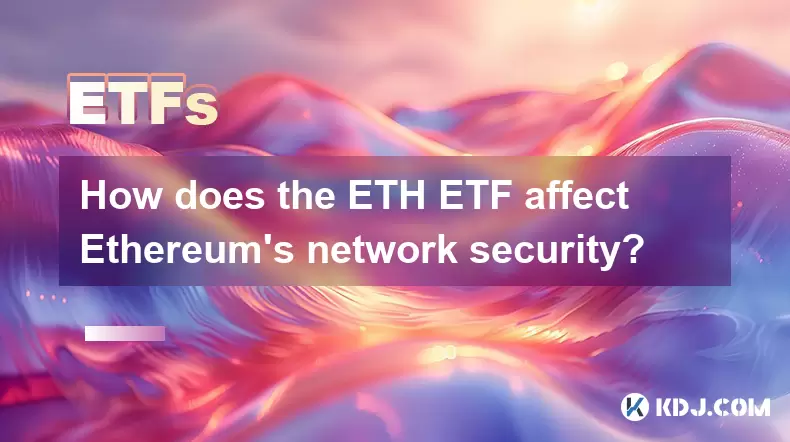
How does the ETH ETF affect Ethereum's network security?
Jul 17,2025 at 01:29pm
Understanding the ETH ETF ConceptAn Ethereum Exchange-Traded Fund (ETH ETF) is a financial product that allows investors to gain exposure to Ethereum ...
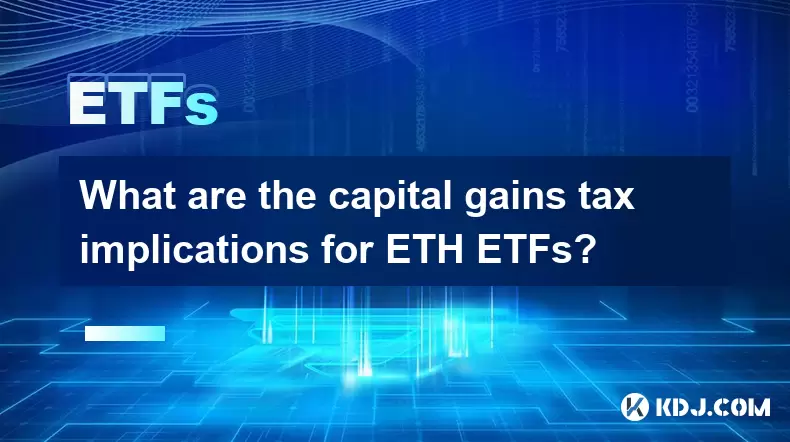
What are the capital gains tax implications for ETH ETFs?
Jul 18,2025 at 08:00am
Understanding Capital Gains Tax in Cryptocurrency InvestmentsCapital gains tax is a tax imposed on the profit realized from the sale of an asset that ...
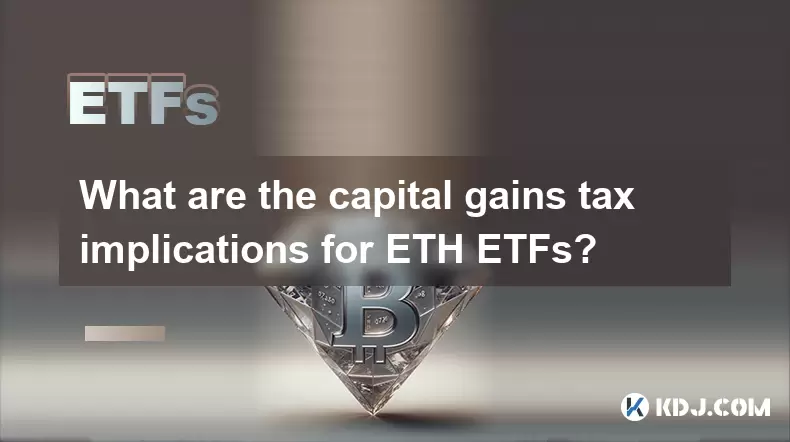
What are the capital gains tax implications for ETH ETFs?
Jul 21,2025 at 11:14am
Understanding ETH ETFs and Their TaxationAn Ethereum Exchange-Traded Fund (ETH ETF) allows investors to gain exposure to Ethereum without directly own...
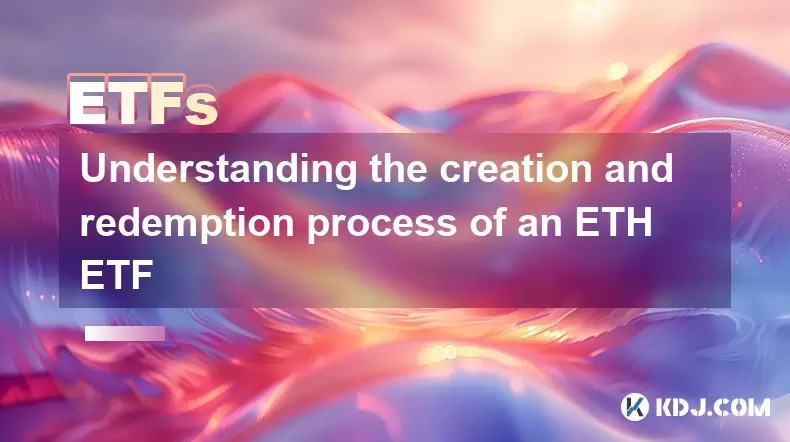
Understanding the creation and redemption process of an ETH ETF
Jul 19,2025 at 07:36am
What is an ETH ETF?An ETH ETF (Ethereum Exchange-Traded Fund) is a financial product designed to track the price of Ethereum without requiring investo...

How to analyze which ETH ETF is the best choice
Jul 19,2025 at 05:01pm
Understanding ETH ETFs and Their RelevanceEthereum Exchange-Traded Funds (ETFs) have emerged as a popular investment vehicle for those seeking exposur...

Long-term outlook for Ethereum ETFs
Jul 22,2025 at 06:42am
What Exactly Is an Ethereum ETF?An Ethereum Exchange-Traded Fund (ETF) is a financial product that tracks the price of Ethereum (ETH) and is traded on...

How does the ETH ETF affect Ethereum's network security?
Jul 17,2025 at 01:29pm
Understanding the ETH ETF ConceptAn Ethereum Exchange-Traded Fund (ETH ETF) is a financial product that allows investors to gain exposure to Ethereum ...

What are the capital gains tax implications for ETH ETFs?
Jul 18,2025 at 08:00am
Understanding Capital Gains Tax in Cryptocurrency InvestmentsCapital gains tax is a tax imposed on the profit realized from the sale of an asset that ...

What are the capital gains tax implications for ETH ETFs?
Jul 21,2025 at 11:14am
Understanding ETH ETFs and Their TaxationAn Ethereum Exchange-Traded Fund (ETH ETF) allows investors to gain exposure to Ethereum without directly own...

Understanding the creation and redemption process of an ETH ETF
Jul 19,2025 at 07:36am
What is an ETH ETF?An ETH ETF (Ethereum Exchange-Traded Fund) is a financial product designed to track the price of Ethereum without requiring investo...

How to analyze which ETH ETF is the best choice
Jul 19,2025 at 05:01pm
Understanding ETH ETFs and Their RelevanceEthereum Exchange-Traded Funds (ETFs) have emerged as a popular investment vehicle for those seeking exposur...
See all articles

























































































